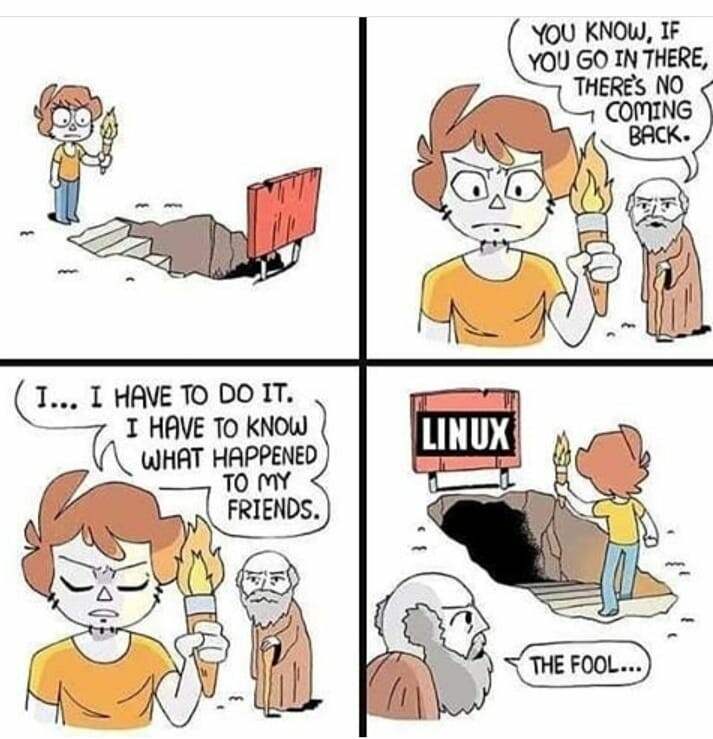this post was submitted on 02 Mar 2024
1302 points (98.2% liked)
linuxmemes
24852 readers
665 users here now
Hint: :q!
Sister communities:
Community rules (click to expand)
1. Follow the site-wide rules
- Instance-wide TOS: https://legal.lemmy.world/tos/
- Lemmy code of conduct: https://join-lemmy.org/docs/code_of_conduct.html
2. Be civil
- Understand the difference between a joke and an insult.
- Do not harrass or attack users for any reason. This includes using blanket terms, like "every user of thing".
- Don't get baited into back-and-forth insults. We are not animals.
- Leave remarks of "peasantry" to the PCMR community. If you dislike an OS/service/application, attack the thing you dislike, not the individuals who use it. Some people may not have a choice.
- Bigotry will not be tolerated.
3. Post Linux-related content
- Including Unix and BSD.
- Non-Linux content is acceptable as long as it makes a reference to Linux. For example, the poorly made mockery of
sudoin Windows. - No porn, no politics, no trolling or ragebaiting.
4. No recent reposts
- Everybody uses Arch btw, can't quit Vim, <loves/tolerates/hates> systemd, and wants to interject for a moment. You can stop now.
5. 🇬🇧 Language/язык/Sprache
- This is primarily an English-speaking community. 🇬🇧🇦🇺🇺🇸
- Comments written in other languages are allowed.
- The substance of a post should be comprehensible for people who only speak English.
- Titles and post bodies written in other languages will be allowed, but only as long as the above rule is observed.
6. (NEW!) Regarding public figures
We all have our opinions, and certain public figures can be divisive. Keep in mind that this is a community for memes and light-hearted fun, not for airing grievances or leveling accusations. - Keep discussions polite and free of disparagement.
- We are never in possession of all of the facts. Defamatory comments will not be tolerated.
- Discussions that get too heated will be locked and offending comments removed.
Please report posts and comments that break these rules!
Important: never execute code or follow advice that you don't understand or can't verify, especially here. The word of the day is credibility. This is a meme community -- even the most helpful comments might just be shitposts that can damage your system. Be aware, be smart, don't remove France.
founded 2 years ago
MODERATORS
you are viewing a single comment's thread
view the rest of the comments
view the rest of the comments

As an avid user who has primarily used Windows and Linux only for recovery purposes when Windows goes tits up , I've been playing with Nobara and Linux mint on a small 180gb SSD and I'm intimidated by the terminal knowledge that is needed when things don't go right .
I also have a steam deck so technically I've been playing with arch btw
As opposed to the trial and error required when things don't go right on Windows? :)
Let's be honest to ourselves - for more complex problems, we'd be pretty much dead in the water without an internet search engine on either system. However, on Linux, at least you can do failure tree isolation relatively systematic: narrow the issue down, and eventually fix it (or find out it's not fixable, e.g. certain driver compatibility for specific hardware). For windows, it's mostly trial and error until you find "the right solution". Rarely is there any good resource for narrowing your problem down, mostly because of the absence of good advice for terminal commands, or because each windows version shuffles settings around to a new place / config file and holds duplicates and triplicates of settings god-knows-where.
An now on a toilet break after trying to fix a permission problem with a local network NAS. I am so fed up with all the (u)mounting, users/groups, chmod/chown and so on, as I am now 3 hours in to it.
Yes, on windows its a trial and error with two ir three checkboxes, done in a few minutes or half an hour. The terminal-knowledge mentionned is definitely a big thing, even with modern distros like Linux Mint I am using right now
My experience was that I was done in a free minutes or half an hour, but, crucially, the problem wasn't fixed. I had very meager options, and I'd exhausted all of them. In a Linux system, it might take longer, but at least I have the confidence that it can be fixed.
Local Network NAS is not something that the typical user that just scrolls memes on a browser and occasionally edits a document has to face. Setting that up on a Windows machine is just as convoluted on the permission side, but instead of writing neat commands, you have to hunt for buttons on nested upon nested settings dialogs that make no sense and don't follow any logical structure anymore.
Maybe, havent had the same project on windows. What I had was the need to connect a second monitor/projector, which I can say from experience, was NOT easily done on Linux (I had to mess with stretched monitor, the duplicating didnt work and so on)